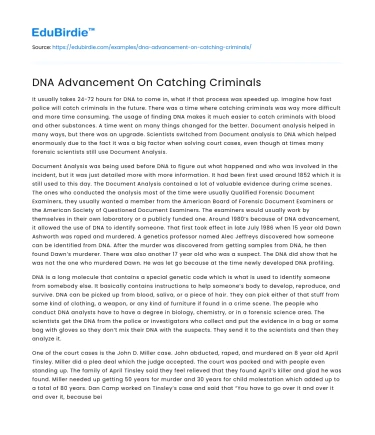It usually takes 24-72 hours for DNA to come in, what if that process was speeded up. Imagine how fast police will catch criminals in the future. There was a time where catching criminals was way more difficult and more time consuming. The usage of finding DNA makes it much easier to catch criminals with blood and other substances. A time went on many things changed for the better. Document analysis helped in many ways, but there was an upgrade. Scientists switched from Document analysis to DNA which helped enormously due to the fact it was a big factor when solving court cases, even though at times many forensic scientists still use Document Analysis.
Document Analysis was being used before DNA to figure out what happened and who was involved in the incident, but it was just detailed more with more information. It had been first used around 1852 which it is still used to this day. The Document Analysis contained a lot of valuable evidence during crime scenes. The ones who conducted the analysis most of the time were usually Qualified Forensic Document Examiners, they usually wanted a member from the American Board of Forensic Document Examiners or the American Society of Questioned Document Examiners. The examiners would usually work by themselves in their own laboratory or a publicly funded one. Around 1980’s because of DNA advancement, it allowed the use of DNA to identify someone. That first took effect in late July 1986 when 15 year old Dawn Ashworth was raped and murdered. A genetics professor named Alec Jeffreys discovered how someone can be identified from DNA. After the murder was discovered from getting samples from DNA, he then found Dawn’s murderer. There was also another 17 year old who was a suspect. The DNA did show that he was not the one who murdered Dawn. He was let go because at the time newly developed DNA profiling.
Save your time!
We can take care of your essay
- Proper editing and formatting
- Free revision, title page, and bibliography
- Flexible prices and money-back guarantee
DNA is a long molecule that contains a special genetic code which is what is used to identify someone from somebody else. It basically contains instructions to help someone’s body to develop, reproduce, and survive. DNA can be picked up from blood, saliva, or a piece of hair. They can pick either of that stuff from some kind of clothing, a weapon, or any kind of furniture if found in a crime scene. The people who conduct DNA analysts have to have a degree in biology, chemistry, or in a forensic science area. The scientists get the DNA from the police or investigators who collect and put the evidence in a bag or some bag with gloves so they don’t mix their DNA with the suspects. They send it to the scientists and then they analyze it.
One of the court cases is the John D. Miller case. John abducted, raped, and murdered an 8 year old April Tinsley. Miller did a plea deal which the judge accepted. The court was packed and with people even standing up. The family of April Tinsley said they feel relieved that they found April’s killer and glad he was found. Miller needed up getting 50 years for murder and 30 years for child molestation which added up to a total of 80 years. Dan Camp worked on Tinsley’s case and said that “You have to go over it and over it and over it, because being unsolved, there was something that I was missing, and I wasn’t seeing it, and that’s how I felt about it,”which Camp said back in 2009. Michael Henslick was arrested for a murder back in 2009 but his DNA showed he’s been arrested multiple times which make him more of a suspect and which in the end he was. Henslick was charged first degree murder of 22 year old Holly Cassano. They found blood on the body of Holly that was not her own blood. As they searched and searched for a match for the unknown DNA, they could not find any. They asked Henslick for a blood sample, but he denied. On a cigarette bud that Henslick smoked, investigators gave it to scientists where they took the DNA sample from there which matched the blood on Holly’s body. Robert Eugene Brashers sexually assaulted, beaten, and strangled Genevieve Zitricki in her bathtub at her home. He left DNA matching another case with the same DNA, in that case he killed a mother and 12 year old daughter. His DNA matched multiple old cases which he served time for. He died during a standoff in 1999. All these court cases led back to catching criminals due to them leaving some kind of sampled DNA and helping the police catch the rightful criminal.
DNA advancement is constantly getting better and better as time passes. Benefits for DNA advancement are you need less data, less time, and perhaps less cost. DNA advancement is very useful, especially in court cases, and were a beneficial upgrade from Document Analysis. Scientists have made so much progress and can be the reason we solve cases in hours in the future.






 Stuck on your essay?
Stuck on your essay?

